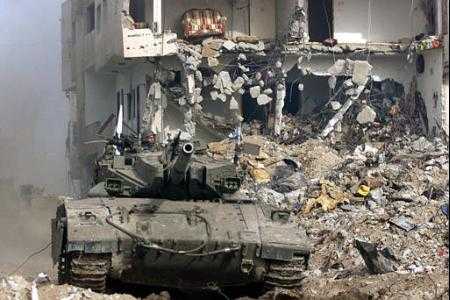Supreme Court to Hear Petitions on Removal of Dead Bodies of Palestinian Fighters and Civilians from Jenin Refugee Camp
Tomorrow, Sunday, 14 April 2002, the Israeli Supreme Court will hear petitions calling for the cessation of the burial of bodies of Palestinian fighters and civilians in mass graves in the Jenin refugee camp. The petitions will be heard at 11:30 am by a three-judge panel of Justices Matza, Englard and Rivlin.
Tomorrow, Sunday, 14 April 2002, the Israeli Supreme Court will hear petitions calling for the cessation of the burial of bodies of Palestinian fighters and civilians in mass graves in the Jenin refugee camp. The petitions will be heard at 11:30 am by a three-judge panel of Justices Matza, Englard and Rivlin.
Yesterday, Adalah and LAW - The Palestinian Society for the Protection of Human Rights and the Environment filed a motion for an injunction and a petition demanding the immediate cessation of the burial of Palestinians in mass graves in the camp. The petition, filed by Adalah Staff Attorney Jamil Dakwar, also requested that the International Committee of the Red Cross and the Palestinian Red Crescent Society be permitted to enter the camp and to evacuate the dead bodies and bring them to hospital. In addition, they sought to allow burials to be conducted in a respectful manner by family members of the deceased.
Similar petitions were also filed yesterday by Members of Knesset Mohammad Barakeh and Ahmed Tibi. At 10:10 pm last night, Supreme Court Chief Justice Aharon Barak upheld the petitioners' request for an injunction calling on the Israeli army to immediately stop any evacuation or burial of bodies until the hearing has taken place.
Immediately after the filings, Justice Englard ordered the State to respond to the motion for the injunction and the petition without delay. At approximately 9 pm yesterday, the representative of the Attorney General's office responded, stating that Israeli forces will not distinguish between the bodies of fighters and civilians in regards to their burial, but that the Israeli army has not yet buried any bodies and will not do so until Sunday. This contradicts evidence received by eyewitnesses from the Jenin refugee camp, who reported that the Israeli army was currently conducting such burials. It also contradicts previous statements by the Israeli army, who said that Palestinian fighters killed in Jenin would be buried in a separate cemetery. It should be noted that the Chief Rabbinate of the Military has approved the continuation of the burials during the Sabbath.
The State added that the Israeli army cannot permit humanitarian organizations to enter the area because some of the bodies may be booby-trapped with bombs. While humanitarian organizations will be permitted to evacuate the bodies and transfer them to the families of the deceased in the near future, they conditioned that the bodies must be buried at once. If this is not done in the first such evacuation, no further evacuations will be permitted.
Professor Derrick Pounder, MD, expert forensic pathologist from University of Dundee (Scotland) and part of Amnesty International's current delegation to Israel/Palestine, will be accompanying Adalah and LAW to the Court. He will also be available for comment to the media following the hearing.














